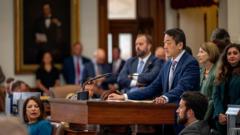The loss of life due to flash floods in central Texas has exceeded 100, with many still unaccounted for four days post-disaster. Search and rescue teams continue their efforts amid worsening weather conditions, as communities grapple with the emotional and logistical aftermath of this tragedy.
Texas Floods: Death Toll Surpasses 100 as Communities Grieve

Texas Floods: Death Toll Surpasses 100 as Communities Grieve
Devastating floods in central Texas claim over 100 lives, prompting urgent calls for improved emergency measures.
Many victims were associated with Camp Mystic, a girls’ summer camp, where 27 individuals perished, including 10 campers and a counselor who remains missing. Richard Eastland, the camp's director, is being hailed a hero for trying to save children during the crisis. In retrospect, the National Weather Service (NWS) forecasts additional storms could lead to more flooding.
In the aftermath of the floods, questions regarding the effectiveness of the government’s disaster response have emerged. Critics argue that budget cuts to the NWS may have hindered their capacity to adequately handle the situation, particularly as casualties mounted in Kerr County, which suffered the majority of deaths with 84 confirmed (56 adults and 28 children).
Despite a petition calling for flood sirens to ensure timely warnings, measures to implement these have been debated for nearly a decade without resolution. Texas Lt. Gov. Dan Patrick acknowledged the possibility that such sirens could have reduced fatalities and expressed commitment to establishing them by next summer.
While some officials sought to deflect blame for disaster preparedness, the White House maintained that the floods were an "act of God," with the NWS having issued multiple warnings in advance of the storm. Texas Senator Ted Cruz urged a focus on recovery rather than partisan disputes over responsibility. Meanwhile, global expressions of sympathy flowed in, including heartfelt condolences from King Charles III to the victims' families, underscoring the widespread human impact of the tragedy.
In the aftermath of the floods, questions regarding the effectiveness of the government’s disaster response have emerged. Critics argue that budget cuts to the NWS may have hindered their capacity to adequately handle the situation, particularly as casualties mounted in Kerr County, which suffered the majority of deaths with 84 confirmed (56 adults and 28 children).
Despite a petition calling for flood sirens to ensure timely warnings, measures to implement these have been debated for nearly a decade without resolution. Texas Lt. Gov. Dan Patrick acknowledged the possibility that such sirens could have reduced fatalities and expressed commitment to establishing them by next summer.
While some officials sought to deflect blame for disaster preparedness, the White House maintained that the floods were an "act of God," with the NWS having issued multiple warnings in advance of the storm. Texas Senator Ted Cruz urged a focus on recovery rather than partisan disputes over responsibility. Meanwhile, global expressions of sympathy flowed in, including heartfelt condolences from King Charles III to the victims' families, underscoring the widespread human impact of the tragedy.





















